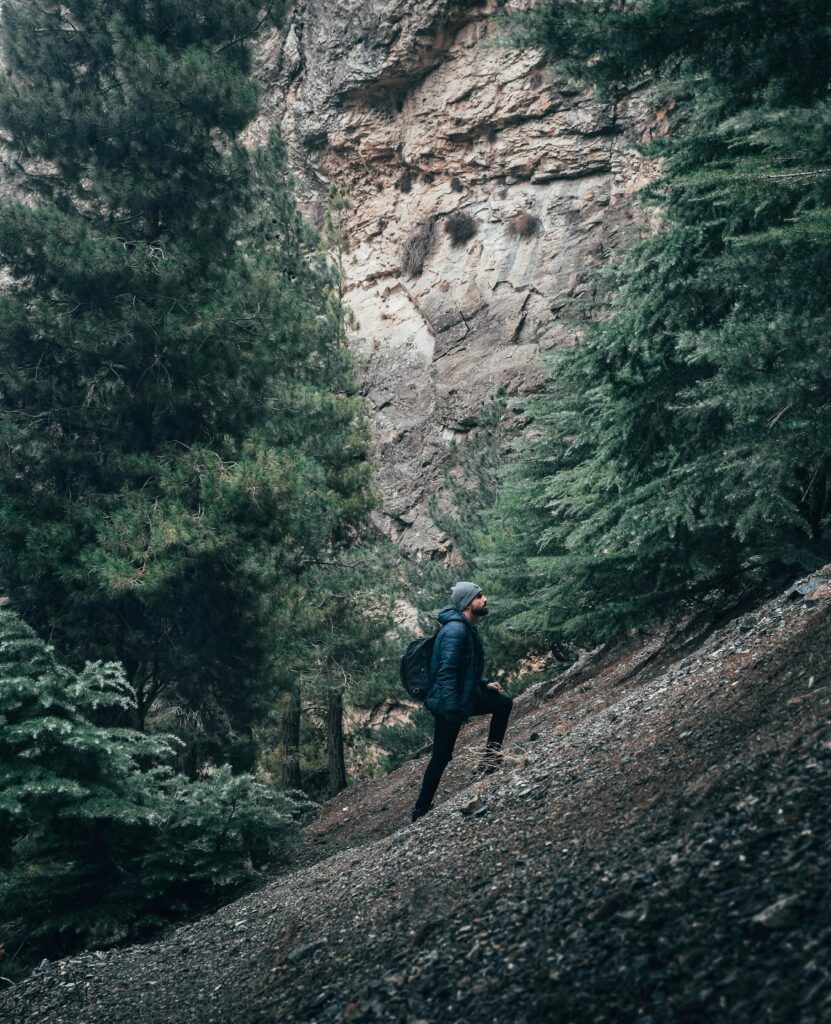Hiking is more than just a simple outdoor activity; it is a great way to connect with nature rejuvenating the mind and pushing the body to its limits and finally after reaching the end destination you get to see and experience the fantastic views that nature has to offer that makes us feel so much intensely connected to the nature.In this blog, we’ll explore why hiking is such a fulfilling hobby and dive into the essential hiking gear and equipment that can elevate your experience.

why Hiking is a great hobby
Hiking isn’t just a hobby, it’s an all-in-all activity that comes with adventure, fitness, and tranquility in a single activity. some of the benefits of hiking are :
- Physical fitness and cardiovascular health
- Mental wellness and stress reduction
- Exploration of breathtaking natural landscapes
- A low-cost adventure that requires minimal equipment to start
- Hiking also helps to explore the wildlife of the nature
Essential Hiking Gears
Hiking Shoes and Boots
Investing in the right hiking footwear is crucial for any trail enthusiast. Top hiking shoes should provide:
- Excellent ankle support
- Water-resistant materials
- Robust traction for various terrain types
- Comfort for long-distance hiking trails
Recommended Hiking Shoes:
- Trail Running Shoes for Light Hiking
- Mid-Height Hiking Boots for Moderate Trails
- Heavy-Duty Mountaineering Boots for Challenging Terrain
Must-Have Hiking Accessories
Hiking Sticks and Trekking Poles
Hiking sticks are game-changers for serious trail explorers. Quality trekking poles offer:
- Improved balance on challenging trails
- Reduced stress on knees and joints
- Enhanced stability during river crossings
- Support for carrying heavy backpacks
Hiking Backpacks
A good hiking backpack is essential for any trail adventure. Look for:
- Comfortable shoulder straps
- Multiple compartments
- Water-resistant material
- Appropriate size for day hikes or multi-day treks
Choosing the Best Hiking Trails
Types of Hiking Trails
- Day Hiking Trails
- Short routes
- Easily accessible
- Perfect for beginners
- Mountain Hiking Trails
- Challenging terrain
- Stunning elevation views
- Requires more advanced equipment
- Forest and Nature Trails
- Dense woodland paths
- Rich biodiversity
- Moderate difficulty
Top Hiking Destinations
- Pacific Crest Trail (California to Washington)
- Appalachian Trail (Eastern United States)
- Everest base camp
- Kilimanjaro
- Inca trail to Machu picchu
Hiking Safety Tips
Preparing for Your Trail Adventure
- Check weather conditions
- Carry sufficient water and snacks
- Pack a first-aid kit
- Inform someone about your hiking route
- Carry navigation tools (map, compass, GPS)
Hiking Clothing Essentials
- Moisture-wicking base layers
- Breathable hiking pants
- Waterproof outer layers
- Hiking socks with cushioning
- Hat and sun protection
Beginner’s Guide to Trail Etiquette
- Stay on marked hiking trails
- Leave no trace
- Respect wildlife
- Be considerate of other hikers
- Follow local trail guidelines
FAQ’s about Hiking
Q1: How Do I Choose the Right Hiking Trail for My Fitness Level?
A: Selecting the right hiking trail depends on your fitness and experience:
- Beginners: Start with short, well-marked trails (2-5 miles)
- Intermediate Hikers: Look for moderate trails with some elevation
- Advanced Hikers: Seek challenging mountain trails or longer routes
- Always check trail difficulty ratings and read recent trail reviews before setting out
Q2: What Essential Items Should I Pack for a Day Hike?
A: Your hiking day pack should include:
- Plenty of water (at least 2 liters)
- High-energy snacks
- First-aid kit
- Navigation tools (map, compass, or GPS)
- Sun protection (sunscreen, hat, sunglasses)
- Extra layers of clothing
- Emergency shelter (lightweight emergency blanket)
- Flashlight or headlamp
- Multi-tool or knife
- Portable charger
Q3: How Can I Prevent Blisters and Foot Pain While Hiking?
A: Prevent hiking-related foot issues by:
- Investing in high-quality, well-fitted hiking shoes
- Wearing moisture-wicking hiking socks
- Breaking in new hiking boots before long trails
- Using moleskin or blister prevention patches
- Keeping feet dry and changing socks if they become damp
- Using hiking sticks to reduce stress on feet and joints
Q4: What’s the Best Time of Year for Hiking?
A: Hiking seasons vary by location:
- Spring: Mild temperatures, beautiful wildflowers
- Summer: Longest days, most accessible trails
- Fall: Stunning foliage, cooler temperatures
- Winter: Requires special gear, ideal for experienced hikers
- Always check local trail conditions and weather forecasts
Q5: How Do I Stay Safe on Hiking Trails?
A: Hiking safety tips include:
- Always hike with a partner or inform someone of your route
- Carry emergency communication devices
- Check weather conditions before departing
- Bring sufficient water and food
- Carry a basic first-aid kit
- Stay on marked trails
- Be aware of local wildlife and potential hazards
- Carry bear spray in wilderness areas if recommended
Q6: What’s the Difference Between Hiking and Trekking?
A: Key differences include:
- Hiking: Typically shorter, day-long adventures on established trails
- Trekking: Longer journeys, often multi-day, covering more challenging terrain
- Hiking usually requires less specialized gear
- Trekking often involves camping and more extensive preparation
Q7: How Can I Improve My Hiking Fitness?
A: Prepare for hiking by:
- Regular cardiovascular exercise
- Strength training, especially for legs and core
- Practice walking with a loaded backpack
- Do stair climbing or hill walking
- Incorporate stretching and flexibility exercises
- Start with shorter trails and gradually increase difficulty
Q8: What Should I Wear Hiking?
A: Recommended hiking clothing:
- Moisture-wicking base layers
- Breathable, quick-drying hiking pants or shorts
- Layered clothing for temperature changes
- Sturdy hiking boots or trail shoes
- Thick, cushioned hiking socks
- Hat for sun protection
- Lightweight, waterproof jacket
Conclusion: Your Hiking Journey Begins
Hiking is an incredible way to explore the world, challenge yourself, and connect with nature. With the right hiking gear, proper preparation, and a sense of adventure, you can transform your weekends and create unforgettable memories on countless hiking trails.
Disclaimer: Always consult local trail guides and experienced hikers before embarking on new hiking routes.




